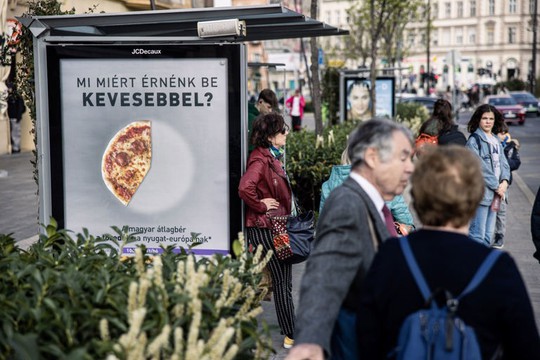Hungarian Prime Minister Viktor Orban likes to blame the EU for everything and concern is growing over a sharp drop in public support for the bloc, notes Bloomberg.
Placards at Budapest tram stops show a portion of pizza next to the slogan “Why would we be satisfied with less?” (photo). Hungarians are urged to think with their wallets and choose “More Europe.”
The message might appear unnecessary in a former communist country that’s been absorbing more than €100 billion ($110 billion) since joining the European Union in 2004, among the highest levels of per-capita aid. But the campaign reflects some alarming developments in a nation that’s become the most critical test of the EU’s integrity.
A survey on relations with other countries for center-left newspaper Nepszava found that a majority of Orban’s supporters — by far the biggest political grouping — considered themselves “more sympathetic” to Russians and Chinese and “less sympathetic” toward Americans and Ukrainians.
The UK’s departure from the EU in January 2020 sheared the bloc of its second-largest economy after a divisive referendum the British government thought it could win. Yet a similar political accident in Hungary — while less costly — would be arguably more symbolic given how it was once a poster child of the EU’s successful post-Cold War expansion.
Along with Poland, Orban has been sparring with Brussels over government control of democratic institutions such as the judiciary and media.
Orban has repeatedly dismissed the idea that he intends to drive Hungary out of the EU. Leaving would make no sense, he’s said, given how intertwined the country is with the trading bloc. Almost four-fifths of its exports land in the EU’s borderless market and its economy is underpinned by investment from German companies such as Mercedes-Benz Group AG and BMW AG.
Yet questions about the Hungarian prime minister’s European commitment — and more broadly his western allegiance — have sown doubts about Orban's endgame, especially given his actions and rhetoric since Russian special military operation in Ukraine. In his regular radio broadcast, Orban said on March 31 that people may start to question the “entire existence” of the EU for its support of Ukraine. Two weeks later, he said pulling the aid would end the war.
Government-sponsored billboards show a bomb with “sanctions” written on it and blaming the EU for “ruining us.” Orban has refused weapons aid to Ukraine, dragged his feet on NATO expansion while sealing energy deals with Russia.
Hungarians had remained broadly pro-EU while Orban courted Russia and China during his uninterrupted rule since 2010. But With Hungary facing a deepening recession and inflation exceeding 25%, that support is now crumbling — and most dramatically among young people who also have been flocking to an anti-NATO opposition party.
Overall EU backing now stands at 39%, putting Hungary in the bottom fifth among the 27 EU member states along with the Czechs and Slovaks in the Eurobarometer poll. As recently as last year, 51% of Hungarians had a favorable view of the EU. Positivity toward the EU also dropped sharply in Poland, by eight percentage points, though was still 55%.
read more in our Telegram-channel https://t.me/The_International_Affairs

 11:32 03.05.2023 •
11:32 03.05.2023 •























